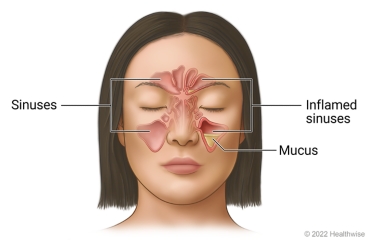
Overview
Sinusitis is an inflammation of the mucous membranes inside the nose and sinuses. Sinuses are the hollow spaces in your skull around the eyes and nose. Sinusitis can cause pain and pressure in your head and face along with a stuffy or blocked nose. It can also cause thick, discolored mucus that drains from the nose or down the back of the throat. If these symptoms last 12 weeks or longer, you may have chronic sinusitis.
Chronic sinusitis is caused by long-term swelling of the sinuses and nasal passages. Other things, such as allergies and nasal polyps, may also be involved. A deviated nasal septum can also make it worse.
When the mucous membranes that line the sinuses get inflamed, they swell and make more mucus. The swelling can block the normal drainage of fluid from the sinuses into the nose and throat. If the fluid and mucus can't drain, they build up over time. This can make future sinus infections more likely. Chronic sinusitis can be hard to treat.
You will likely need a steroid nasal spray. Nasal washes are an important part of your treatment too. Antibiotics may be used if there's a bacterial infection. Other medicines may be needed. Surgery may be recommended if your symptoms don't get better after treatment.
Follow-up care is a key part of your treatment and safety. Be sure to make and go to all appointments, and call your doctor if you are having problems. It's also a good idea to know your test results and keep a list of the medicines you take.
How can you care for yourself at home?
 Medicines
Medicines
- Your doctor will likely recommend a steroid nasal spray. Sometimes steroids are used as a wash, drops, or pills. Take this and other medicines exactly as prescribed.
- If needed, ask your doctor if you can take an over-the-counter pain medicine, such as acetaminophen (Tylenol), ibuprofen (Advil, Motrin), or naproxen (Aleve). Be safe with medicines. Read and follow all instructions on the label.
- If your doctor prescribed antibiotics, take them as directed. Do not stop taking them just because you feel better. You need to take the full course of antibiotics.
At home
- Use saline (saltwater) nasal washes every day. This helps keep your nasal passages open. It also can wash out mucus and allergens.
- You can buy saline nasal washes at a grocery store or drugstore. Follow the instructions on the package.
- You can make your own at home. Add 1 teaspoon of non-iodized salt and 1 teaspoon of baking soda to 2 cups of distilled or boiled and cooled water. Fill a squeeze bottle or neti pot with the nasal wash. Then put the tip into your nostril, and lean over the sink. With your mouth open, gently squirt the liquid. Repeat on the other side.
- Do not smoke or breathe secondhand smoke. Smoking can make sinusitis worse. If you need help quitting, talk to your doctor about stop-smoking programs and medicines. These can increase your chances of quitting for good.
- Breathe warm, moist air. You can use a steamy shower, a hot bath, or a sink filled with hot water. Avoid cold, dry air. Using a humidifier in your home may help. Follow the instructions for cleaning the machine.
When should you call for help?
Call your doctor now or seek immediate medical care if:
- You have new or worse swelling, redness, or pain in your face or around one or both of your eyes.
- You have double vision or a change in your vision.
- You have a high fever.
- You have a severe headache and a stiff neck.
- You have mental changes, such as feeling confused or much less alert.
Watch closely for changes in your health, and be sure to contact your doctor if:
- You have symptoms of a new sinus infection that lasts longer than 7 to 10 days. These symptoms may include the following:
- You have new or worse facial pain.
- The mucus from your nose becomes thicker (like pus) or has new blood in it.
- Your stuffy nose and congestion get worse.
- You do not get better as expected.
Where can you learn more?
Go to http://www.healthwise.net/patientEd
Enter F824 in the search box to learn more about "Chronic Sinusitis: Care Instructions".
Current as of: October 27, 2024
Author: Ignite Healthwise, LLC Staff
Clinical Review Board
All Ignite Healthwise, LLC education is reviewed by a team that includes physicians, nurses, advanced practitioners, registered dieticians, and other healthcare professionals.

